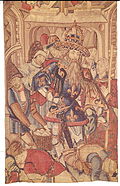Francis Crane
Sir Francis Crane (ca. 1579 – ca. 1636) was the founder of Mortlake Tapestry Works [1] at Mortlake on the south bank of the river Thames in South West London.
Biography
The tapestry works almost ruined Crane, as it involved him in considerable outlay of capital for an inadequate return, and in 1623 he was forced to appeal to the King, James I for financial help. James I died in 1625 and Crane was given much more favourable terms by the new King, Charles I, whose secretary he had been since 1617.[2] He sat in the Parliaments of 1614 and 1621 as MP for Penryn and that of 1624 for Launceston.[3][4]
In 1629 the King gave him the Manor of Stoke Bruerne in Northamptonshire, where he built Stoke Park, a fine Palladian house, possibly with assistance from Inigo Jones.
Family
Crane's brother, Richard Crane, was created a baronet in 1643.
See also
Notes
- ^ Hefford 2008.
- ^ "Portrait of Crane by Van Dyke auctioned at Sotheby's in 2002 for £227,000". Retrieved 20 August 2008.
- ^ Courtney 1888, pp. 9–10.
- ^ Willis 1750, pp. 177, 188.
References
- Courtney, William Prideaux (1888). . In Stephen, Leslie (ed.). Dictionary of National Biography. Vol. 13. London: Smith, Elder & Co. pp. 9–10.
{{cite encyclopedia}}: Invalid|ref=harv(help) - Hefford, Wendy (January 2008) [2004]. "Crane, Francis". Oxford Dictionary of National Biography (online ed.). Oxford University Press. doi:10.1093/ref:odnb/6601. (Subscription or UK public library membership required.)
- Willis, Browne (1750). Notitia Parliamentaria, Part II: A Series or Lists of the Representatives in the several Parliaments held from the Reformation 1541, to the Restoration 1660 ... London. pp. 177, 188.
{{cite book}}: Invalid|ref=harv(help)
- 1579 births
- 1636 deaths
- 16th-century English people
- 17th-century English people
- British weavers
- Businesspeople from London
- English businesspeople
- English knights
- English MPs 1614
- English MPs 1621–1622
- English MPs 1624–1625
- History of Northamptonshire
- Members of the pre-1707 English Parliament for constituencies in Cornwall
- Mortlake, London
- People of the Stuart period
- People of the Tudor period

